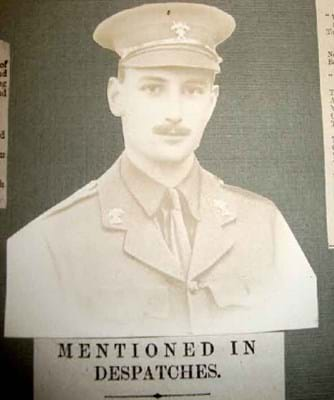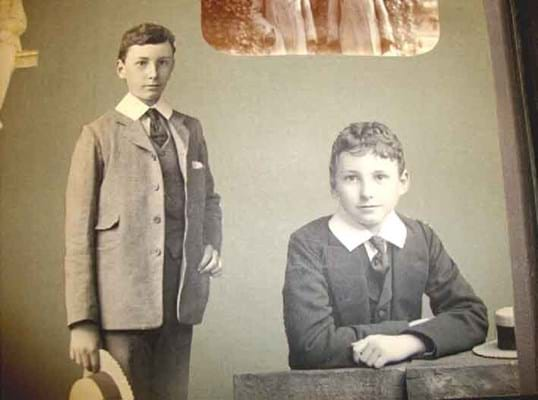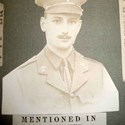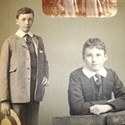Now for the first time, his story can be told, after a remarkable archive of documents and pictures chronicling his short and tragic life, has come to light, providing a poignant reminder of the 'lost generation' of young men who died in the war that was supposed to end all wars.
The archive, uncovered during a house clearance in the south of England, goes for auction at Mullock's Auctioneers next sale of historical documents in Ludlow, Shropshire on November 22 - and is expected to make over £1000.
Musgrave Cazenove Wroughton - known affectionately as 'Bob' by his friends and family - came from a well-to-do Northamptonshire family. His father was master of the Pytchley Hunt and they lived in a mansion in the country.
A close family friend was Sir Robert Baden-Powell, hero of the Siege of Mafeking during the Boer War, and when 'BP' came up with the idea of organising a camp for boys to teach them the principles of leadership and teamwork, he immediately turned to 'Bob' Wroughton to join him in his venture.
The camp was held on Brownsea Island in Poole Harbour, Dorset, in August 1907 - and became an historic event. For it was that beginning that the World Wide Boy Scout Movement was to emerge. The centenary camp for the global movement was also held on Brownsea.
After the Camp, Baden Powell heaped praise on Bob's leadership : "…he was a great help to me & quite set the example to other Patrol Leaders," he wrote in a remarkable letter to Bob's mother, which forms part of the archive and in which he also asked her for Bob's suggestions as to how the whole Scouting movement could be established.
High Potential
"It was clear that Bob had a glittering career ahead of him," said auctioneer Richard Westwood-Brookes. "He was from a landed, moneyed family, receiving high praise from a national hero and clearly destined for great things."
A career in the army was a natural progression. He was commissioned in November 1913, and when war broke out the following August joined the 12th Lancers where again he received high praise for his courage. His Major wrote of him that he was an "excellent soldier and can turn his hand to anything".
After just a few weeks of the war, he had gained a gallantry honour, being Mentioned in Disptaches by the Commander in Chief, Sir John French.
But Bob Wroughton's career was not to last much longer. While out on patrol in the notorious Ypres salient in Belgium in October - just eight weeks after the war began - he was shot by a German sniper, and on the 30th of that month, he died from his injuries. He was 23 years old.
A distraught Baden Powell wrote to his parents soon after the event: "I have felt as nearly as possible like a second father to him, and to read the little testimonies to Bob's character after all the hopes that I had formed of him, is the greatest possible comfort. I am so glad that he had made his mark already before he died."
His parents also received letters from some of Bob's men. His Sergeant Major, sending a snapshot of his makeshift grave, said: "He was such a brave young officer and loved by the whole of his Troop & Squadron. Sgt Stone & I carried him to a place of cover, his last words to me were 'never mind me Sgt Major, look after yourself'."
A private named Haselin, who was also a servant at the Wroughton household, wrote, sending his 'dog-tag' and mentioned how he was protected by Bob on the day he was wounded: "I have his horses with me, he told me yesterday to look after the horses and not go into the trenches so was not in the thick of it, but I wish I had been with him all the same..."








